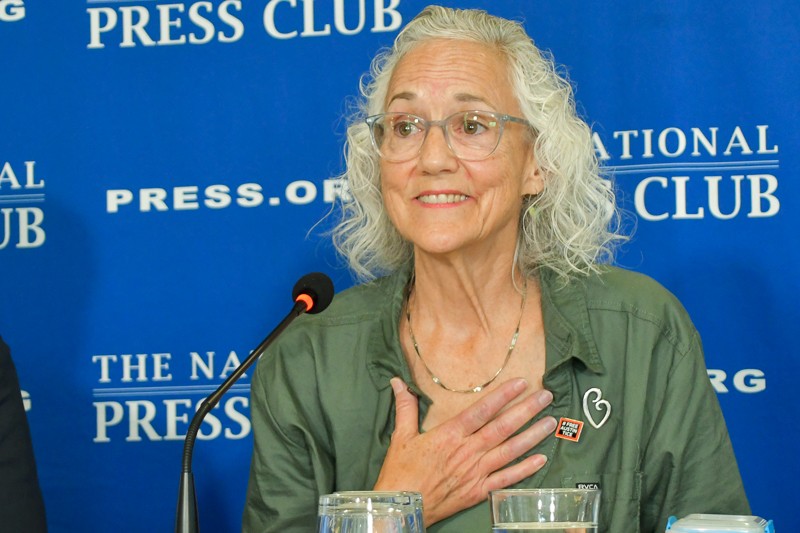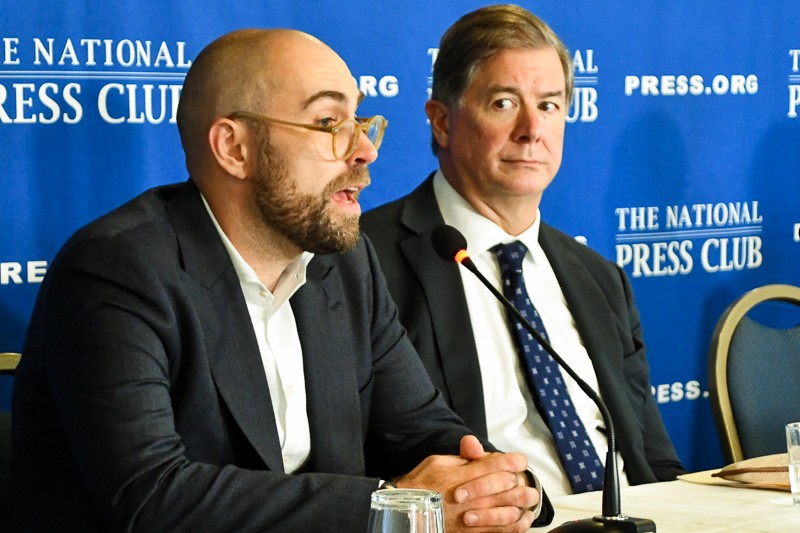Message from all-day Press Freedom Center conference: Silence, delay no longer acceptable in Austin Tice case
The message echoing through the halls at an all-day conference sponsored by the Press Freedom Center at the National Press Club on Aug. 14, marking the 13th anniversary of Austin Tice’s disappearance, was sobering and direct: The time for quiet diplomacy has passed, and the U.S. government must take bold, visible steps to bring home a beloved journalist.
The event, which brought together journalists, diplomats and human rights advocates, focused on the unresolved case of Austin Tice, a freelance journalist and former Marine who vanished in Syria in 2012 while reporting on the country’s brutal civil war. Despite years of advocacy from his family and supporters, and occasional statements from government officials, there has been no resolution. Tice’s fate remains unknown, and the lack of progress has left many questioning the government’s commitment to his recovery.

Debra Tice, Tice’s mother, delivered one of the most emotional and powerful speeches of the day. Her voice trembled as she addressed the crowd, saying, “We are not here to commemorate another year of inaction. We are here to demand that our government do what it takes to bring our son home.”
Her words, filled with frustration and heartbreak, cut through the room. She spoke of the pain of unanswered calls, the torment of waiting, and the sorrow of watching other hostages return while her son remains missing. “I am not asking for miracles,” she said. “I am asking for leadership.” Her plea was met with a standing ovation.
Throughout the day, the conference featured panels with former hostages, press freedom experts, and journalists who have worked in some of the world’s most dangerous conflict zones.
One of the most impactful segments, titled “Examining the Deadly Tank Attack on Journalists,” drew chilling parallels between the risks faced by war correspondents and the lack of accountability when they are harmed or abducted. The discussion, documented in the Press Freedom Center’s official video, highlighted the systemic failures that leave journalists vulnerable and their families without answers.

Speakers throughout the event repeatedly stressed that the U.S. government must be more transparent about its efforts to locate and recover Tice. Several panelists criticized the lack of public updates and the continued reliance on behind-the-scenes diplomacy, arguing that such approaches have not worked and only prolong the suffering of families.
Jason Rezaian, a journalist for The Washington Post who was held in Iran for 544 days, shared his own experience and challenged the government’s current strategy. “We need to stop pretending that silence is a strategy,” he said.
During the Biden Administration, Rezaian called on the President to appoint a high-level envoy whose sole responsibility would be resolving Tice’s case. He also urged direct engagement with Syrian intermediaries, stressing that this issue goes beyond one individual. “This is not just about Austin,” he said. “It’s about every journalist who risks their life to tell the truth.”
The emotional core of the event remained Debra Tice’s testimony. Her words painted a vivid picture of the human cost of delay. She spoke not only as a mother but as a relentless advocate who has spent more than a decade fighting for answers. Her heartbreak was palpable, but so was her determination. Her call for leadership was not just a demand, it was a challenge to every official who has the power to act.
Besides her emotional remarks, she also made news. She shared recently declassified documents from the U.S. government showing that it had daily intelligence about Tice during the early years of his detention, even though for years it told her it lacked information about him.
Beyond her son’s case, the conference also shed light on the growing crisis facing journalists around the world. Attendees discussed the rising number of reporters who are killed, detained, or simply vanish while doing their jobs in conflict zones. The deadly tank attack on journalists in Gaza, analyzed in the Press Freedom Center’s video, served as a grim reminder of the dangers journalists face and the urgent need for international protections. Panelists called for stronger legal frameworks to hold perpetrators accountable and emphasized the importance of enforcing protections under the Geneva Conventions.
As the conference came to a close, CNBC Correspondent and former National Press Club President Emily Wilkins delivered a final message that captured the spirit of the day. “We cannot let another year pass with empty promises,” she said. “Austin Tice must come home. And we must ensure no journalist is ever forgotten.”
